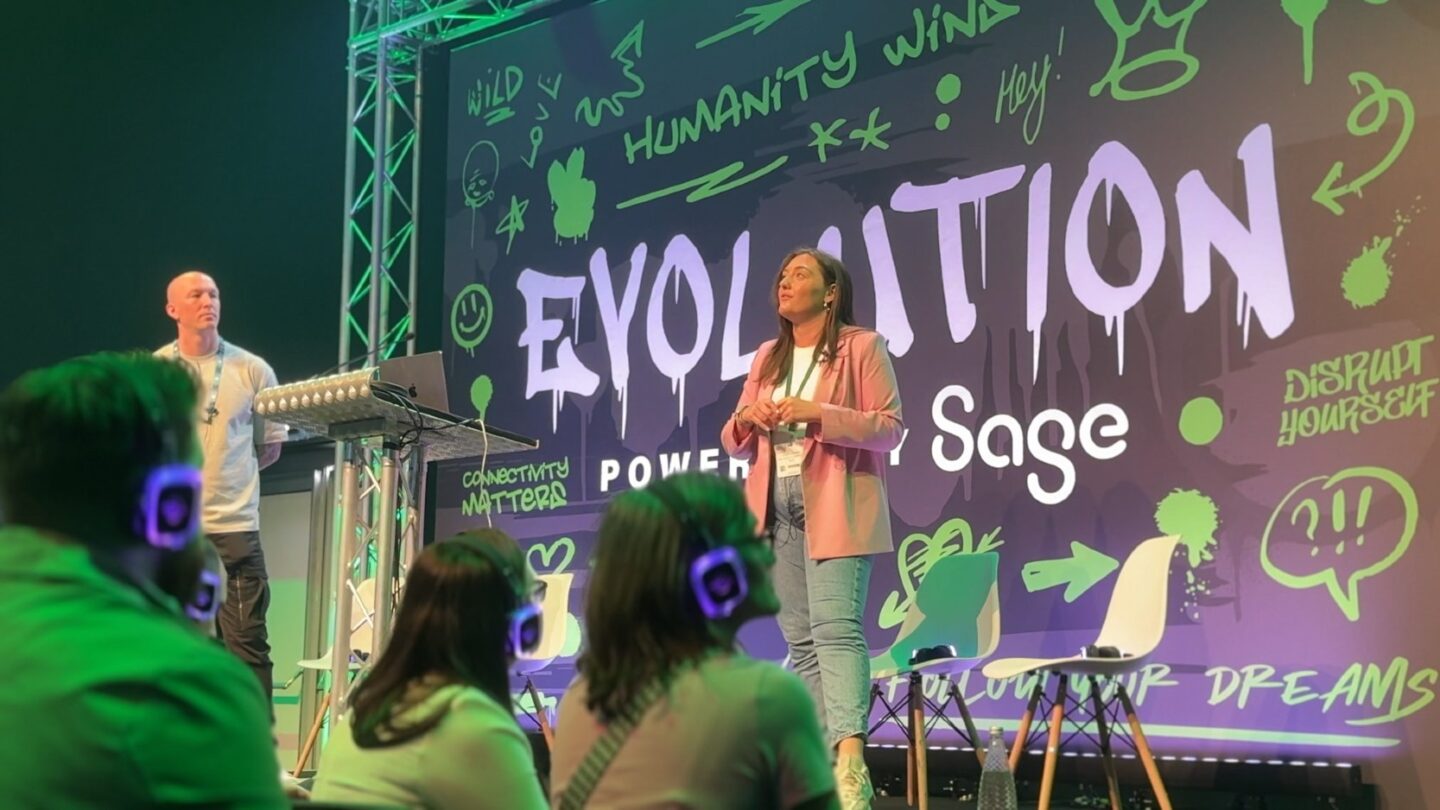Growth & Customers
Navigating new tech frontiers: 5 action points from Digital Accountancy Show 2024
Discover five highlights from the Digital Accountancy Show 2024 that will help you and your accountancy or bookkeeping practice get ahead.

Accountants and bookkeepers were back in force for Digital Accountancy Show 2024 in London.
With more than 3,000 attendees, 100 speakers, and 160 vendors, it was the largest the event has ever been.
As anticipated, the integration of artificial intelligence (AI) in accounting processes was a crucial part of the discussions happening on the stalls and in speaker sessions given its rapidly expanding role in the industry.
Speakers at the event highlighted how AI could positively impact the accounting profession by streamlining routine tasks.
This shift promises to free up valuable time, allowing accountants and bookkeepers to focus on the aspects of their work they are most passionate about.
Alongside AI were important discussions on the ways it can help in Anti-Money Laundering (AML), environmental, social and governance (ESG), mental health, digitalisation, and compliance.
In this article, explore 5 action points from the event that every accountant and bookkeeper needs to know about.
Here’s what this article covers:
- 1. AI isn’t coming for your job (but you do need to think about it)
- 2. Be vigilant around Anti-Money Laundering processes
- 3. You should live and breathe ESG
- 4. Accounting today should be about getting back to what you love
- 5. Mental health is wealth
- Final thoughts
1. AI isn’t coming for your job (but you do need to think about it)
An overwhelming amount of the conversations over the 2 days revolved around answering questions brought about by the rise of AI such as:
How do we use it?
Should we trust it?
Can it help me and my clients?
Will it replace me?
These conversations, however, were far from talks of revolutions, transformative shifts, or mass displacement.
Instead, discussion focused on education, implementation, building processes, and testing and the practical next steps the industry needed to take for successful integration.
In a session led by Jason Staats, founder of accounting content company, Realize, he raised an important point: that people have been saying accountants are going to be replaced for decades.
They also said computers would replace accountants when they first came out, but instead became a widely used tool across almost all industries.
In reality, AI’s use would be similar.
So, it’s unlikely that it will replace you, but it might come to do some of the jobs you currently do day-to-day.
AI education and testing emerged as far more important than AI’s early promise of flashy quick-fix tools first suggested.
On this topic, Lucy Cohen of Mazuma Accountants said there’s no such thing as “plug and play”.
Every new tech solution needs to be carefully implemented, have internal buy-in from the staff in your practice, and everyone needs to become confident through comprehensive education and training in the AI products used.
Lucy Cohen and Richard Sergeant from Principle Point, a consulting firm specialising in accounting and business principles, emphasised a pragmatic approach in their discussion on the lagging cloud adoption within the industry.
They recommended that accountants start by leveraging the AI capabilities integrated into the software tools they already know and trust.
This foundational step is crucial as AI becomes increasingly prevalent in these existing products.
Understanding how AI functions in these tools and the future plans of software providers to incorporate generative AI is essential.
Transitioning to cloud-based systems will unlock even greater AI capabilities, offering more sophisticated tools and efficiencies.
2. Be vigilant around Anti-Money Laundering processes
In a fascinating moment which highlighted why accountants and bookkeepers should have a full understanding of AI’s potential, Danielle Fisher, product manager at Sage, demonstrated how deepfake technology could be used to pretend to be her during a facetime call with an accountant.
During the recorded call, which was shown in front of an audience of accountants and bookkeepers, Danielle’s avatar had a seemingly natural conversation about registering a company.
No one in the audience could tell the conversation had been created using widely available, free AI products.
“The way that accountants do AML needs a fundamental shift due to the rise of generative AI and modern technology, which is making it so much easier for criminals to deep fake, create spoofs, and forge documents.”
Danielle fisher, sage
This demonstration hammered home that accountants and bookkeepers need to be vigilant around their Know Your Client and Anti-Money Laundering processes.
This, naturally, can be anxiety-inducing for accountants and bookkeepers, due to the threats of damaging fraudulent behaviours.
However, far from a doom and gloom outlook on AML, Mike Crocker of Gravitate Accounting suggested that diligence in these processes ensured effective onboarding of clients and set the expectations of future interactions with the clients.
Furthermore, the opportunity to support clients in their own efforts to avoid fraudulent and suspicious behaviour will help build trust between you and your clients, while AI can help to be a second line of checks and balances, and even a first, as it develops the knowledge.
AML is a crucial topic for keeping you and your clients on the right side of the law and avoiding any nasty surprises.
3. You should live and breathe ESG
ESG is increasingly becoming a priority for many businesses.
Amid the daily hustle, businesses, accountants, and bookkeepers need to find moments to consider the environmental and ethical impacts of their work.
This focus on sustainability can drive significant positive change.
In a frank, funny, and informative conversation, Sarah Whale of sustainability consultants, Profit Impact, Fran Ellington of Triple Bottom Line Accounting Ltd, and Tessa Hebditch of Chickp Accounting discussed the exciting ways that they have made ESG fundamental to the work they do.
They detailed engaging initiatives such as client-led workshops that have not only fostered environmental and social good but have also brought a new, dynamic edge to their everyday tasks.
The best news from their insightful speaker session was that integrating these sustainable practices has proven to be not only rewarding but also really fun, adding a fresh and exciting dimension to their work.
They cut through some of the esoteric jargon that can surround the subject to get to the heart of being better at having an approach to work that puts people and the planet front and centre.
Rather than jumping in at the deep end and trying to get B Corp certified tomorrow, the group championed getting started with basic steps.
For example, they recommend using the Good Business Charter, a self-assessing process to determine how ESG-oriented your practice is.
Otherwise, checking out the Organisation for Responsible Businesses and other educational resources is another great option.
“It’s something accountants can be really proud to offer their customers as a solution.”
conrad langridge, sage
While there are immediate and obvious ethical benefits from engaging with ESG in your practice, the 3 speakers also discussed the potential these held for new and exciting ways to do business with clients.
For example, by taking clients through workshops and bottom-up approaches to ESG, by getting all the staff in the business in the room to explore the changes they want to see, and by building their action plan together, businesses can meaningfully effect change with every member of staff bought in.
4. Accounting today should be about getting back to what you love
A core theme that emerged from nearly every speaker session and many of the discussions at the vendor stands was about how accounting should be about getting back to the work that made you fall in love with the industry.
For many accountants, this is about supporting small business clients to achieve their potential, focusing on relationship building, and providing that all-important human touch.
This was where AI’s usefulness kept entering the conversation.
AI is a tool, not a replacement. A productivity assistant, not an accountant.
With specialised AI accounting tools, accountants are poised to make work easier, win back time, and improve efficiency across their practices and their clients’ businesses.
Again, this isn’t about accumulating apps and new bits of flashy tech for everything.
However, you’re likely to be using AI within your tech stack already. AI is integrated across all manner of accounting technologies, for example in AP automation in Sage for Accountants and automated data entry in AutoEntry by Sage.
By understanding the technology you use in more detail, you’ll be able to understand where you can spend less time doing monotonous procedural tasks.
Not only will this mean that when you work you get to spend more time doing the tasks you love, it will likely contribute to fewer late nights in front of spreadsheets and answering emails at the weekend.
5. Mental health is wealth
In the fast-paced world of accounting, where deadlines loom and expectations run high, the importance of mental well-being cannot be overstated.
The relentless pressure to deliver accurate reports, meet client demands, and stay ahead of ever-evolving regulations can lead to stress, anxiety, and burnout among accounting professionals.
Recognising the critical link between mental health and overall productivity, the discussions at the Digital Accountancy Show 2024 shed light on the need for practices to prioritise the well-being of their employees.
Speakers emphasised the importance of creating supportive work environments where individuals feel comfortable discussing mental health concerns without fear of stigma or judgment.
Ultimately, the message echoed throughout the event was clear: mental health is not just a personal issue but a collective responsibility of employers and industry stakeholders.
By prioritising mental wellness alongside professional development, you can cultivate a culture of resilience, productivity, and overall satisfaction among your workforce.
Final thoughts
The insights and innovations presented at the Digital Accountancy Show 2024 make it evident that the accounting profession is undergoing some exciting changes.
From embracing AI to reimagining the role of accountants in ESG initiatives, there’s a clear emphasis on staying ahead of the curve.
However, amid these changes, it’s essential to maintain a focus on what truly matters: why you love your job and the well-being of professionals in the field.
By prioritising mental health, fostering a culture of continuous learning, and embracing technological advancements responsibly, you can navigate any changes in the industry with confidence and resilience.








Ask the author a question or share your advice